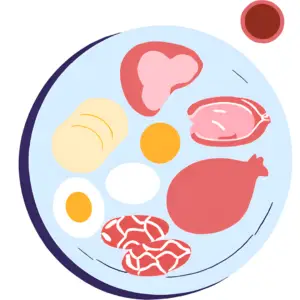You probably have been struggling with gastric symptoms for as long as you can remember or maybe it started just recently and you’ve been trying everything to get it to stop. SIBO usually isn’t the first step in the diagnosis process, at least for me it wasn’t. It took me 12 long years of misdiagnoses, IBS tests, food elimination diets and more before I finally found SIBO online somewhere.
Immediately, it clicked, and I searched high and low for a doctor who could help me; she gave me a SIBO breath test among a few others. When it came back positive, I was happy, because I finally knew what was wrong with me. But what do you do as SIBO breath test preparation? In this article, I’ll go through the test preparations and any other things you might need to know to successfully complete the SIBO breath tests.
What is a SIBO Breath Test?
Small Intestinal Bacterial Overgrowth, or SIBO for short, is a condition with too many bacteria in the small intestine. This causes several uncomfortable symptoms because these bacteria feast on the food in your digestive tract. This can cause malnutrition, but also symptoms like bloating, cramps and diarrhea, because of the gases the bacteria produce.
So how do you test for this? There are two tests commonly used to test for SIBO. The first, and best, test is a breath test: this test measures hydrogen and methane levels after drinking a glucose solution (a drink so sugary it tastes a bit bitter, but it’s easily drinkable, so don’t worry.).
Why hydrogen and methane specifically? These are two of the gases that the large amount bacteria in your small intestine produce after they have eaten. They cause most of the symptoms for SIBO, but they can also be easily tested for in your breath, because the excess of gases leave your body through your lungs. In other words, you breathe it out. The amount is then tested by having you breathe in a little bag.
So does it matter which type of bacteria you have an overgrowth of? Yes: some bacteria produce hydrogen, others produce methane, some even produce hydrogen sulfide. All of these can be tested with breath tests.
The tests
Why does the breath test work? If you have excessive bacteria in your small intestine, they break down the sugar too early, producing gases that are detected in your breath sample. The test typically takes 2-3 hours, and accurate preparation is crucial to ensure reliable results.
Another approach, small intestine fluid analysis, was once considered reliable but is no longer recommended due to contamination risks.

Additional tests, such as blood work for vitamin deficiencies, stool tests for fat absorption issues, and imaging scans (X-ray, CT, or MRI) for structural abnormalities, may also be used to identify underlying causes of symptoms. Like I said before, my doctor gave me a multitude of tests to get an understanding of what was going on.
Here’s a blog post outlining the different SIBO breath tests.
What Medications & Supplements to Avoid as SIBO breath test preparation?
So what should you do before the test:
- Two weeks before: stop taking any antibiotics! Naturally, for a condition that is based on too many bacteria, if you’re keep using antibiotics during the test, you might not be measuring the right quantity, so it’s best to plan your test after any rounds of antibiotics and ensure you have two weeks of 0 antibiotics to give the body time to go back to the usual quantities it works under.
- One week before: stop taking probiotics & prebiotics. Probiotics are good bacteria that are helpful to the body, whereas prebiotics are food for these good bacteria. Both of these can understandably influence the amount of gases present on your breath, so it’s good to give your body some time to work without them to be able to measure accurately.
- Two days before testing: stop using any laxatives & digestive enzymes. Since we need to understand how your body is functioning, anything that can influence your digestion & GI tract, should be stopped temporarily. Laxatives and digestive enzymes are two such things.
- Note on any other medication, such as Acid-reducing Medications (PPIs, H2 blockers) or anything else: Check with your doctor to determine if and when you should pause these medications before testing.
Note: I was quite nervous that I was somehow going to wrack the test, because I was taking the wrong supplements or digestive enzymes, so I just quit all of them 2 weeks before. It’s best to discuss with your doctor what works for you, but these are the general guidelines. (And remember: you can retake a breath test if you feel like you didn’t do the preparation well enough.)
The SIBO Breath Test Preparation Diet
Because the bacteria in your gut interact with the food you eat, your symptoms can also get worse or better depending on what you eat. This is one of the main reasons the FODMAP diet works so well for IBS patients. However, we don’t want the test to be impacted by what you have or haven’t eaten, therefore, there is a diet you need to follow to prepare for the SIBO breath test.

For 24-48 hours before the test, you should follow a low-fiber, low-residue diet to limit bacterial fermentation in your gut. Some safe foods include:
Plain proteins (chicken, turkey, beef, pork, fish, eggs). No condiments or spices!
White rice or white potatoes (without skin)
Clear broths
Small amounts of olive oil or butter
Black coffee or tea (without sugar or milk)
My thoughts on restrictions as preparation for SIBO breath tests
What did I eat? the day before the test I just ate eggs and white rice. Unfortunately, for this me, I’m a vegetarian and meat wouldn’t work, so I only ate eggs and rice instead. I know this part of the test sucks, especially for those who have already been avoiding certain foods or food groups to deal with symptoms. Luckily, it’s only one day.
Why do you need to avoid certain foods? They can increase fermentation in the intestines, leading to inaccurate test results. Avoid:
High-fiber foods: Vegetables, fruits, beans, nuts, seeds, and whole grains
Dairy products: Milk, cheese, yogurt
Fermentable carbohydrates: Bread, pasta, sugary foods, and artificial sweeteners
Caffeinated and alcoholic beverages: These can impact gut motility

The last twelve hours, what now?
Stop eating and drinking anything except water 12 hours before the test. If you can, it’s helpful to plan the test in the morning.
My doctor handed me my test and I could do it myself, at home, so I planned to do it at morning. This way, I could fast while sleeping and it wasn’t as bad.
If you’re doing the test in the hospital, still try to plan in the morning to make it as comfortable as possible.
You can still drink water (without any flavour of course) before the test. During the test, it’s best not to eat or drink anything. Also try to avoid chewing gum or mints, because they can stimulate digestion.
I was quite hungry after the bland meals from the day before and the fast, so I drank quite a lot of water to deal with the hunger pangs I got.
Lifestyle Factors That Affect Test Accuracy
Several lifestyle habits can interfere with test results:
Exercise & Physical Activity: Avoid intense exercise the day before and during the test to prevent altered digestion rates.
Smoking & Chewing Gum: These introduce extra air into your digestive system and you should avoided them.
Brushing Teeth & Mouthwash Use: If possible, avoid using mouthwash, as some contain alcohol and sugars and can affect results.

The Day of the SIBO Test – Step-by-Step Guide
the steps:
Wake up and avoid food and drink (except water).
Brush your teeth without toothpaste or mouthwash.
Prepare the sugar solution (either glucose or lactulose) as instructed.
Collect the baseline breath sample.
Drink the sugar solution and begin the test. The solution tastes very sweet, sickly even. I didn’t care for it, but it also wasn’t that bad. It’s just a little bit and with one big gulp I had it all in. So best to do it quickly if you’re afraid you don’t like the taste.
Collect breath samples every 15-20 minutes as directed. Be aware: it doesn’t matter if the bag fully inflates or not, as long as you’re breathing in it: you’re fine!
Avoid eating or drinking anything except water until the test is complete.
the feelings:
Note: it can be daunting to do this test fully by yourself at home. I was so afraid I did it wrong, I googled all possible outcomes during and after the test. My doctor said afterwards that it didn’t matter much, if you have SIBO, you have SIBO and unless you make a grave mistake, that will come out of the test.
A big question: Will you experience symptoms during the breath test? It’s the most annoying answer, but it depends. Some people have symptoms that mimick your regular SIBO symptoms (bloating, cramps, diarrhea..) Others have no symptoms at all. The symptoms could also be from the fast or the diet the day before if that’s very different from your regular diet. So in short: try not to worry too much about these symptoms. They don’t indicate any results of the test, it’s best to just wait until you get the results!

What Happens After the Test – the results?
After completing the test, your samples are analyzed for hydrogen and methane gas levels. Results may indicate:
Positive for SIBO: Elevated gas levels suggest bacterial overgrowth.
Negative for SIBO: Normal gas levels indicate no bacterial overgrowth.
Inconclusive Results: Retesting or additional diagnostic tests may be needed. I’ve got a whole blog post here on which results may be positive or negative and here’s a blog post that explains the different types of SIBO and what your results might indicate, a lack of hydrogen doesn’t necessarily mean you don’t have hydrogen Sibo. Here’s why.
Next Steps, what to do after this SIBO breath test?
Unfortunately for us, fixing SIBO right now is not a cure-all, fix-all. There isn’t one specific regimen to do or pill we can take to fix it quickly. Instead, if you test positive, your doctor may recommend antibiotics, herbal antimicrobials, or dietary changes or a combination of these to tackle the problem from multiple angles.

Also, you might be expected to do some more tests to understand if you have vitamin deficiencies. These are common among SIBO patients because the bacteria may eat your food as it is in the small intestine, preventing your body from absorbing those crucial vitamins. Some things that worked for me, might not work for you and vice versa, so try to get advice from multiple doctors if it doesn’t help.
Unexpected negative result?
If you test negative but still have symptoms, further testing for conditions like IBS, food intolerances, or gut dysbiosis may be necessary. Here’s how to tell if it’s Candida or SIBO. A note from me: do not accept a standard diagnosis of IBS until all other possibilities have been ruled out. My doctor was quick to diagnose me with it 8 years ago and never did another test again. I had to seek other professional to help me, because I was certain it was something else.
Retesting may be required 4-6 weeks after completing treatment to ensure SIBO has been resolved. My doctor recommended against this, since she said I would know when the SIBO was gone, since my symptoms were gone too. But if that’s not the case for you, you might need a retest.
Be aware that for some people, getting rid of SIBO may take multiple rounds of antibiotics & antimicrobials, so if you feel like your SIBO isn’t gone, discuss this with your (functional) doctor to see if there are other things you can try.

Conclusion
Proper preparation is key to getting the most accurate results from your SIBO breath test. From adjusting your diet to pausing certain medications, following these steps will help ensure your test is as effective as possible. If you’re unsure about any part of the process, always check with your doctor for personalized advice!
I know the process can be daunting and especially when you’ve been ill for a long time, you might feel like there’s no end in sight. Please hang in there. It got better for me after 12 years and I view my test date as a rite-of-passage to a better life. Good luck with your SIBO breath test preparation and I hope your digestive struggles become a thing of the past!!!
